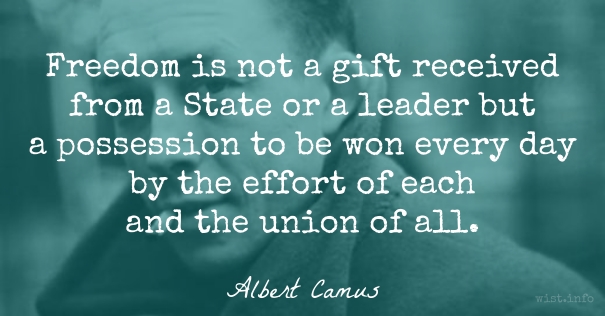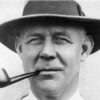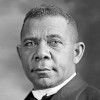Most people would succeed in small things if they were not troubled with great ambitions.
Quotations about:
achievement
Note not all quotations have been tagged, so Search may find additional quotes on this topic.
Ambitious Men cheat themselves, when they fix upon any Ends for their Ambition; those Ends, when they are attained to, are converted into Means, subordinate to something farther.
François VI, duc de La Rochefoucauld (1613-1680) French epigrammatist, memoirist, noble
Réflexions ou sentences et maximes morales [Reflections; or Sentences and Moral Maxims] (1665-1678) [tr. Stanhope (1694), Part 4, ¶65]
(Source)
Reported in multiple translations, but no modern ones. I cannot find the analog for it, the French original, or the "official" number.
Appears in the 1706 (Powell) ed. of Stanhope as ¶711.
Alternate translations:
The ambitious deceive themselves in proposing an end to their ambition; for that end, when attained, becomes a means.
[pub. Donaldson (1783), ¶32]
When the ambitious propose an end to their ambition, they deceive themselves; for, when attained, the end becomes a mean.
[ed. Carville (1835), ¶29]
Optimism is the faith that leads to achievement; nothing can be done without hope.
He achieved success who has lived well, laughed often, and loved much;
Who has enjoyed the trust of pure women, the respect of intelligent men and the love of little children;
Who has filled his niche and accomplished his task;
Who has never lacked appreciation of Earth’s beauty or failed to express it;
Who has left the world better than he found it,
Whether an improved poppy, a perfect poem, or a rescued soul;
Who has always looked for the best in others and given them the best he had;
Whose life was an inspiration;
Whose memory a benediction.Elisabeth-Anne "Bessie" Anderson Stanley (1879–1952) American poet
“Success” (1905)
The essay was written for a poetry contest to answer the question "What is success?" in 100 words or less. It (especially the first 13 words) is often misattributed to Robert Louis Stevenson, Ralph Waldo Emerson, or Elbert Hubbard (the latter probably because the essay appeared in an advertisment in his series of books Little Journeys to the Homes of Great Lovers (e.g.).
More information: Bessie Anderson Stanley - Wikipedia.
A little mind is always hurried, by twenty things at once; but a man of sense does but one thing at a time, and resolves to excel in it; for whatever is worth doing at all is worth doing well.
Lord Chesterfield (1694-1773) English statesman, wit [Philip Dormer Stanhope]
Letter to his son, #71 (10 Mar 1746)
(Source)
There are but two ways of rising in the world: either by your own industry or by the folly of others.
[Il n’y a au monde que deux manières de s’élever, ou par sa propre industrie, ou par l’imbécillité des autres.]
Jean de La Bruyère (1645-1696) French essayist, moralist
The Characters [Les Caractères], ch. 6 “Of Gifts of Fortune [Des Biens de Fortune],” § 52 (6.52) (1688) [tr. Van Laun (1885)]
(Source)
(Source (French)). Alternate translations:
There is but two ways of rising in the World, by your own Industry, and another's Weakness.
[Bullord ed. (1696)]
There are only two ways of rising in the World, by your own Industry, or by the Weakness of others.
[Curll ed. (1713)]
There are but two ways of rising in the World, by your own Industry, or the Weakness of others.
[Browne ed. (1752)]
There are only two ways of getting on in the world: either by one's own cunning efforts, or by other people's foolishness.
[tr. Stewart (1970)]
From the sublime to the ridiculous is but a step.
Napoleon Bonaparte (1769-1821) French emperor, military leader
Comment to the Abbé du Pradt (10 Dec 1812)
(Source)
During the retreat from Moscow, a repeated comment during a discussion with one of his ambassadors. Quoted by Archibald Alison, History of Europe from the Commencement of the French Revolution in 1789, to the Restoration of the Bourbons in 1815, Vol. 16, ch. 73 (1842). See also Paine.
Alt. trans.:
- "There is but one step from the sublime to the ridiculous."
- "There is only one step from the sublime to the ridiculous."
- "From the sublime to the ridiculous there is but a step."
It is intended that we shall accomplish all, through law, that we can accomplish for ourselves. God gives every bird its food, but does not throw it into the nest. He does not unearth the good that the earth contains, but He puts it in our way, and gives us the means of getting it ourselves.
Sooner or later, we are all asked to compromise ourselves and the things we care about. We define ourselves by our actions. With each decision, we tell ourselves and the world who we are. Think about what you want out of this life, and recognize that there are many kinds of success.
Bill Watterson (b. 1958) American cartoonist
Commencement Address, Kenyon College (20 May 1990)
(Source)
Some are born great, some achieve greatness, and some hire public relations officers.
Daniel J. Boorstin (1914-2004) American historian, professor, attorney, writer
(Attributed)
See Shakespeare.
Practical equality of opportunity for all citizens, when we achieve it, will have two great results. First, every man will have a fair chance to make of himself all that in him lies; to reach the highest point to which his capacities, unassisted by special privilege of his own and unhampered by the special privilege of others, can carry him, and to get for himself and his family substantially what he has earned. Second, equality of opportunity means that the commonwealth will get from every citizen the highest service of which he is capable. No man who carries the burden of the special privileges of another can give to the commonwealth that service to which it is fairly entitled.
No pain, no palm;
No thorns, no throne;
No gall, no glory;
No cross, no crown.William Penn (1644-1718) English writer, philosopher, politician, statesman
“No Cross, No Crown” (1682)
Originally written while a prisoner in the Tower of London (1668-69). See Quarles (1821).
You long to “leap at a single bound into celebrity.” Nothing is so common-place as to wish to be remarkable. Fame usually comes to those who are thinking about something else, — very rarely to those who say to themselves, “Go to, now, let us be a celebrated individual!”
For when the One Great Scorer comes to mark against your name,
He writes — not that you won or lost — but how you played the Game.
We aim above the mark to hit the mark.
Ralph Waldo Emerson (1803-1882) American essayist, lecturer, poet
“Nature,” Essays: Second Series (1844)
(Source)
We judge ourselves by what we feel capable of doing, while others judge us by what we have already done.
I have learned that success is to be measured not so much by the position that one has reached in life as by the obstacles which he has overcome while trying to succeed.
My mother drew a distinction between achievement and success. She said that achievement is the knowledge that you have studied and worked hard and done the best that is in you. Success is being praised by others, and that’s nice too, but not as important or satisfying. Always aim for achievement and forget about the success.
Those blush to lose a conquering game,
And fain would peril life for fame:
These bring success their zeal to fan;
They can because they think they can.[Hi proprium decus et partum indignantur honorem
ni teneant, vitamque volunt pro laude pacisci;
hos successus alit: possunt, quia posse videntur.]Virgil (70-19 BC) Roman poet [b. Publius Vergilius Maro; also Vergil]
The Aeneid [Ænē̆is], Book 5, l. 229ff (5.229-231) (29-19 BC) [tr. Conington (1866)]
(Source)
Of the crews of the two remaining ships racing at the funeral games of Anchises: Cloanthus' Scylla which is closing on the finish line; Mnestheus' Pristis which has come up from last place and may yet take the lead. (Cloanthus wins the race by offering a sacrifice to the sea gods.)
(Source (Latin)). Alternate translations:
These their new glory, honours got despise,
Unless they keep it, and to gaine the prize
Would sell their lives; success feeds them; they may
Because they think they can obtain the day.
[tr. Ogilby (1649)]
Resolv'd to hold their own, they mend their pace,
All obstinate to die, or gain the race.
Rais'd with success, the Dolphin swiftly ran;
For they can conquer, who believe they can.
[tr. Dryden (1697)]
These are fired with indignation, lest they should lose their possession of glory and honor they have won; and they are willing to barter life for renown. Those success cherishes; they are able because they seem to be able.
[tr. Davidson/Buckley (1854)]
These scorn to lose the honour that is their own, the glory in their grasp, and would sell life for renown; to these success lends life; power comes with belief in it.
[tr. Mackail (1885)]
These, thinking shame of letting fall their hardly-gotten gain
Of glory's meed, to buy the praise with very life are fain;
Those, fed on good-hap, all things may, because they deem they may
[tr. Morris (1900), l. 228ff]
These scorn to lose their vantage, stung with shame,
And life is wagered willingly for fame.
Success inspires the hindmost; as they dare,
They do; the thought of winning wins the game.
[tr. Taylor (1907), st. 31, l. 274ff]
The leaders now with eager souls would scorn
to lose their glory, and faint-hearted fail
to grasp a prize half-won, but fain would buy
honor with life itself; the followers too
are flushed with proud success, and feel them strong
because their strength is proven.
[tr. Williams (1910)]
These think it shame not to keep the honour that is theirs, the glory they have won, and would barter life for fame: those success heartens; strong are they, for strong they deem themselves.
[tr. Fairclough (1916)]
On the Scylla
They would give their lives to hold their place, they have won it,
The glory and honor are theirs already, almost;
And Mnestheus’ men take courage from their nearness;
They can because they think they can.
[tr. Humphries (1951)]
One crew was compelled by the shame of losing a prize they had all but
Gained for their own, and would give their lives for its glory; the other
Was fired by success -- they could do it because they believed they could do it.
[tr. Day-Lewis (1952)]
Cloanthus' crewmen
now think it a disgrace to fail to keep
the fame and honor they themselves have won,
and they would give their very lives for glory;
but Menestheus' men are strengthened by success,
they have the power because they feel they have it.
[tr. Mandelbaum (1971), l. 301ff]
One crew fought off the shame of losing honor
Theirs already, glory won; they'd give
Their lives for fame; but luck empowered the others
Who felt that they could do it, and so could.
[tr. Fitzgerald (1981), l. 294ff]
Cloanthus and his men on the Scylla saw the honour as theirs by right. They had already won the victory and had no intention of giving it up. They would rather have lost their lives than lose the glory. Mnestheus and his men on the Pristis were feeding on success. They could win because they thought they could.
[tr. West (1990)]
The former crew are unhappy lest they fail to keep
the honour that is theirs and the glory already
in their possession, and would sell their lives for fame.
the latter feed on success: they can because they think they can.
[tr. Kline (2002)]
One crew, stung by the shame of losing victory now
with glory won, would trade their lives for fame.
But Mnestheus and his crew, fired by their success,
can just about win the day because they think they can.
[tr. Fagles (2006), l. 256ff]
One crew would hate to lose the glory of an honor all but one. They'd trade their lives for victory. The others were encouraged by success. Belief in victory spurred them on.
[tr. Bartsch (2021)]



























